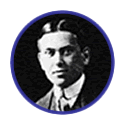
Django Reinhardt in 1947
Serious Business
by Shelton Hull
The legend of Belgian-born Swing savant Django Reinhardt has made its way around the world in every conceivable direction, in the process influencing the approach of countless artists of every stripe. His seminal role in the evolution of jazz guitar is a given, as well as in the instrument’s application to what later became (in its various forms) rock and roll. The articulation of men like Jimmy Page, Tony Iommi and Eddie Van Halen owes much to Django, as indeed does any guitarist with an affinity for the kind of single-note lines you’ll hear coming down the bridge of much metal. Likewise, the willowy, bucolic tones common to indie-rock at its best (think “Off You” by the Breeders, or Pavement’s “Range Life”) are direct descendants of the sound perfected in collaboration with his brother Joseph in the Hot Club of France.
Guitarists are one thing; there are also hornsmen (trumpeters, especially) who’ve emulated his lines, pianists who dig his harmonics, drummers who seek to recapitulate that inimical Euro-swing beat. There are also the dancers, artists, writers, filmmakers. Django is not by accident the exemplar of a mood, a look, a feel of cosmopolitan Europe in the years surrounding World War II. To listen to Django is to hear the sound of music that was almost wiped off the Earth forever. It is the sound of love, lust, friendship and the greatest of common human value. In the end, it is the sound of victory.
This year, 2007, has made itself already the subject of much commemoration, but it’s worth mentioning here that it marks the 60th anniversary of one of the most unique and salubrious pairings in music history. 1947 was the year that Django, fascinated with bebop and intrigued by the technical achievements of Charlie Christian, Les Paul and the great Basie-ite Freddie Green, made his first recordings on electric guitar.
This aspect of his output has, understandably, gotten less attention than the indispensable work he did in his first recorded decade, but a good listen will be very rewarding for any jazz fan. All of the qualities that make him an icon to acoustic players, from his deft touch and innovative phrasings to his choice of material and sidemen, are amplified, literally, with the addition of electricity. Unlike in the older recordings, where Django’s lead lines blend in with two rhythm guitars, bass and violin or clarinet, electrification sets him firmly out front. The contrast helps to deepen his group’s harmonics, reaching to the near edge of counterpoint. We can only guess what this group, which knocked off seven sick 78s for Blue Star Records in just two days, could have accomplished in the LP format. The year began normally enough, with a session for 12-piece band on April 16 (a date that needs something positive associated with it), followed immediately by four tracks with an acoustic quintet. The core of the electric output was recorded in two sessions on July 6 and July 18. Besides Django, the two sidemen to record in both quintet sessions were clarinetist Hubert Rostaing and drummer Andre Jourdan, each of whom are crucial figures in Djangology. Three tracks in particular– “Blues For Barclay,” “Vette” and “Swing 48”– are like a manifesto of this new intent. For the first time, the addition of drums to his small group brings both power and swing in ample supply. Whatever they were feeding the drummers in Paris back then, Americans should be feeding to their marching bands. Hearing these tracks ten years ago for the first time, their trap game was a major revelation. The opening break on “Vette” might be the best seven seconds of brushwork ever recorded, and his solo on “Swing 48” somehow bridges the entire jazz drumming tradition that existed to that point, without ever betraying pastiche. Clearly, Jourdan, Jean-Louis Viale, Al Craig and Ted Curry owned a lot of records!
The drummers brought Django’s silken muscularity to the fore. Never had his lines sounded so hornlike. Given his infamous initial reaction to the work of Charlie Parker, one wishes there were living record of Parker hearing this stuff. The idea of the two in collaboration constitutes the very definition of “fantasy booking.” I can imagine either Django’s guitar in the piano spot of Parker’s ‘47 group (with Miles Davis, Curley Russell and Roy Haynes) or Parker in Rostaing’s spot. It’s certainly a shame that the two weren’t acquainted in the early ’50s– they might have saved each other’s lives!
The specific tracks cited above were culled from a French bootleg CD, but a good bit of this material should be available in more savory forms. Verve reissued a bunch of the electric ‘47-‘53 materials as the double-disc Peche a la Mouche , but that has amazingly fallen out-of-print. The electrified Django really needs to be anthologized in some definitive way, perhaps through Mosaic, Verve or even Rhino.
Django Reinhardt continued to dabble with electric guitar until his death six years later; the definitive version of “Brazil” was taped weeks before a stroke, at 43. He died unsure if he’d even be remembered, not knowing his legacy was already secure. Django’s story is compelling in so many ways– its passions and politics, its sheer human interest value, the force of the man’s personality– but at the core is the master of a particular approach, one whose resonance has only been enhanced by time. Unfortunately, he died before he could really work the New York City clubs, where he’d have surely found a rapturous audience, but if you want to know what such an experience might have been like, the 1947 Blue Star sessions offer the best of hints. ◼












